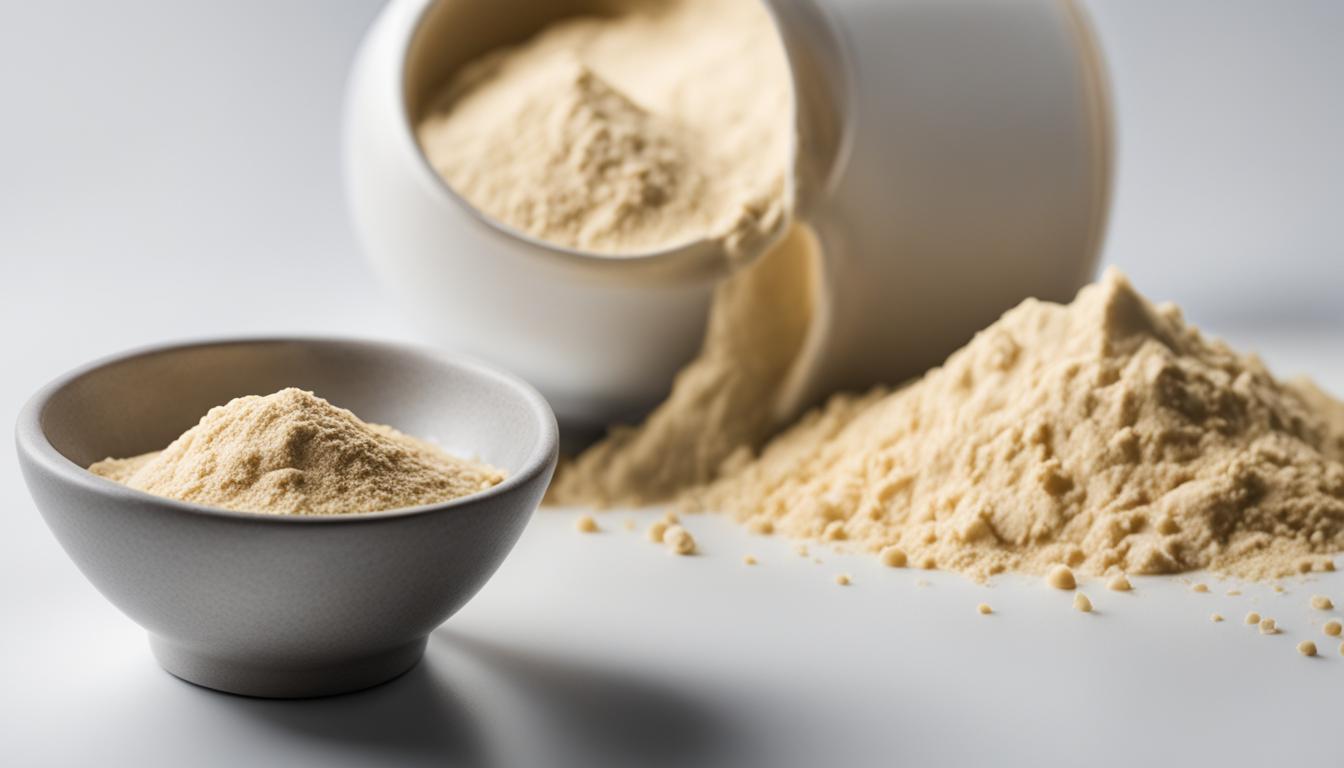Whey protein is a popular dietary supplement among fitness enthusiasts and athletes due to its numerous health benefits. However, with so many types of whey protein available on the market, it can be difficult to determine which one is the best for you. In this article, we will compare two of the most common forms of whey protein: whey protein isolate and concentrate.
We will discuss the differences between whey protein isolate and concentrate, their nutritional compositions, and their respective benefits. Additionally, we will examine the effectiveness of whey protein isolate and concentrate for muscle gain and weight loss purposes.
Key Takeaways:
- There are many types of whey protein, but whey protein isolate and concentrate are the most popular.
- Whey protein isolate has a higher protein content, lower lactose and fat content, and faster absorption rate than whey protein concentrate.
- Whey protein concentrate contains a moderate protein content, higher levels of lactose and fat, and slower digestion rate than whey protein isolate.
- The choice between whey protein isolate and concentrate ultimately depends on individual preferences, dietary needs, and fitness goals.
- Both whey protein isolate and concentrate can support muscle growth and recovery, as well as aid in weight loss by promoting satiety and preserving lean muscle mass.
Understanding Whey Protein
Whey protein is a popular dietary supplement that comes in various types, including whey protein isolate and concentrate. These types of whey protein are derived from milk and contain high-quality proteins that offer numerous benefits for fitness and dietary needs.
Whey protein isolate is a type of whey protein that undergoes further processing to remove most of the fat, lactose, and other non-protein components, yielding a product that is approximately 90% protein. This results in a product that is fast-absorbing and easy to digest, making it an ideal choice for individuals who are lactose intolerant or have digestive issues.
Fact: Whey protein isolate often contains fewer carbohydrates and fats than whey protein concentrate, making it a popular choice for those on a low-carbohydrate or low-fat diet.
On the other hand, whey protein concentrate is a less processed form of whey protein that retains more of the milk’s nutrients, including fat, lactose, and other non-protein components. This results in a product that is less protein-dense, typically containing around 70-80% protein. While whey protein concentrate is a slower-absorbing protein, it contains more bioactive compounds and nutrients, such as conjugated linoleic acid (CLA) and immunoglobulins, that may offer additional health benefits.
| Whey Protein Isolate | Whey Protein Concentrate | |
|---|---|---|
| Protein Content | 90% | 70-80% |
| Amino Acid Profile | Higher levels of essential amino acids, such as leucine and lysine | Lower levels of essential amino acids than isolate |
| Digestion Rate | Fast | Slow |
Both whey protein isolate and concentrate offer various benefits, including muscle growth and recovery, weight loss, and improved immune function. They are also rich in amino acids, such as leucine, that play a vital role in muscle protein synthesis.
- Fact: Whey protein is considered a complete protein, as it contains all nine essential amino acids that cannot be synthesized by the body and must be obtained through the diet.
- Fact: Leucine is an essential amino acid that is particularly important for muscle growth and recovery. Whey protein is high in leucine, making it an ideal choice for athletes and fitness enthusiasts.
Overall, understanding the different types of whey protein and their benefits can help individuals make informed decisions about their dietary supplement choices. Whether you choose whey protein isolate or concentrate depends on your specific dietary needs, fitness goals, and personal preferences.
Whey Protein Isolate: The Key Features
When it comes to whey protein, one type that stands out is whey protein isolate. This type of whey protein is known for its high protein content and low levels of lactose and fat. Below are some of the key features and benefits of whey protein isolate.
| Feature | Whey Protein Isolate | Whey Protein Concentrate |
|---|---|---|
| Protein Content | Typically 90% or higher | Typically 70-80% |
| Lactose Content | Less than 1% | 5-6% |
| Fat Content | Less than 1% | 5-6% |
Whey protein isolate typically contains at least 90% protein, making it a great option for those who want to maximize their protein intake. Furthermore, it contains very low levels of lactose and fat, which makes it a suitable option for people who are lactose intolerant or watching their calorie intake.
In terms of nutrition, whey protein isolate is a complete protein that contains all of the essential amino acids that the body needs. It is also rich in branched-chain amino acids (BCAAs), which are important for muscle growth and recovery. Additionally, this type of whey protein is quickly absorbed by the body, making it an ideal protein source for post-workout recovery.
Compared to whey protein concentrate, whey protein isolate is more expensive due to its higher protein content and lower levels of lactose and fat. However, many people find that the benefits of whey protein isolate make it worth the extra cost.
Overall, whey protein isolate is a great choice for people who want a high-quality protein source that is low in lactose and fat. It is an ideal option for post-workout recovery and can help support muscle growth and repair.
Whey Protein Concentrate: The Key Features
Whey protein concentrate is a popular form of whey protein that is widely used in the fitness industry. This type of protein is made by removing water, lactose, and minerals from whey, leaving behind a high protein powder.
The key features of whey protein concentrate include:
| Feature | Description |
|---|---|
| Protein Content | Whey protein concentrate typically contains around 70-80% protein, making it a great source of protein for those looking to supplement their diet. |
| Lactose and Fat Content | Whey protein concentrate contains higher levels of lactose and fat compared to whey protein isolate. However, it is still a good source of protein for those who are not lactose intolerant and want a more affordable option. |
| Digestion Rate | Whey protein concentrate is absorbed more slowly in the body compared to whey protein isolate, which means that it can provide a sustained release of amino acids over a longer period. |
| Cost | Whey protein concentrate is generally more affordable compared to whey protein isolate, making it a popular choice for those on a budget. |
Despite containing lower levels of protein than whey protein isolate, whey protein concentrate still offers a variety of benefits for those looking to supplement their diet with protein. It is a great source of essential amino acids, which are important for muscle growth and recovery. It is also rich in branched-chain amino acids (BCAAs), which can help reduce muscle damage and promote muscle protein synthesis.
Additionally, whey protein concentrate is an excellent source of calcium, which is important for strong bones and teeth, and may help reduce the risk of osteoporosis.
Overall, whey protein concentrate is an affordable and effective way to increase your protein intake and support your fitness goals.
Whey Protein Isolate vs Concentrate: A Comparison
When choosing a whey protein supplement, you may come across two main types: whey protein isolate and whey protein concentrate. While both are derived from milk and contain high-quality protein, there are key differences between the two. Let’s take a closer look at the whey protein isolate vs concentrate debate.
| Whey Protein Isolate | Whey Protein Concentrate | |
|---|---|---|
| Protein Content | Higher content of protein – typically at least 90% | Lower content of protein – typically 70-80% |
| Amino Acid Profile | Contains a higher percentage of pure protein per serving and a complete amino acid profile | Contains a slightly lower percentage of pure protein per serving and a less complete amino acid profile |
| Digestion Rate | Fast absorption rate due to its purity, which makes it a good option for post-workout recovery | Slower digestion rate due to the additional nutrients and carbohydrates, making it a good option for general use throughout the day |
| Cost | Usually more expensive due to the higher protein content and purity | Usually less expensive due to the lower protein content but may vary based on the brand and quality |
| Taste | Has a cleaner taste and lighter consistency due to its purity and lower lactose and fat content | May have a richer taste and thicker consistency due to its higher lactose and fat content |
As you can see, there are clear differences between whey protein isolate and whey protein concentrate. Whey protein isolate has a higher protein content, a more complete amino acid profile, a faster digestion rate, and a cleaner taste due to its purity. It is a great option for post-workout recovery or for those who want a higher protein intake without additional carbs and fat.
On the other hand, whey protein concentrate contains a lower amount of protein, but it is also more affordable and may have a richer taste and thicker consistency. It may be a good option for those who want a more balanced protein intake throughout the day or who are looking for a more budget-friendly option.
Ultimately, the choice between whey protein isolate and concentrate depends on your individual needs and preferences. Consider your fitness goals, dietary restrictions, and budget when making a decision. Both types of whey protein can be beneficial for muscle gain, weight loss, and overall health and fitness.
Whey Protein for Muscle Gain and Weight Loss
Whey protein isolate and concentrate are both popular choices among fitness enthusiasts looking to build muscle or lose weight. So, which one is better suited for these goals?
Whey protein isolate vs concentrate for muscle gain:
Both whey protein isolate and concentrate can support muscle growth and recovery due to their high protein content and amino acid profiles. However, whey protein isolate may be a better choice for those looking to maximize muscle gain. This is because it contains a higher percentage of protein per serving, and is absorbed more quickly by the body, providing essential amino acids to muscles faster.
| Nutrient | Whey Protein Concentrate | Whey Protein Isolate |
|---|---|---|
| Protein content | 70-80% | 90-95% |
| Lactose content | 5-6% | 0.5-1% |
| Fat content | 2-3% | 0.5-1% |
| Absorption rate | Medium | Fast |
Whey protein isolate vs concentrate for weight loss:
Both types of whey protein can also aid in weight loss efforts by promoting satiety and preserving lean muscle mass. However, whey protein concentrate may be more suitable for those looking to lose weight due to its slightly higher lactose and fat content. These components can help slow down digestion and keep you feeling full for longer.
| Nutrient | Whey Protein Concentrate | Whey Protein Isolate |
|---|---|---|
| Protein content | 70-80% | 90-95% |
| Lactose content | 5-6% | 0.5-1% |
| Fat content | 2-3% | 0.5-1% |
| Absorption rate | Medium | Fast |
It’s important to note that ultimately, whether you choose whey protein isolate or concentrate for muscle gain or weight loss depends on your individual needs and preferences. It’s important to consult with a healthcare professional or registered dietitian to determine the best protein supplement for you.
Conclusion
In conclusion, choosing between whey protein isolate and concentrate comes down to personal preferences, dietary needs, and fitness goals. Both types of whey protein offer numerous benefits, including muscle growth and recovery, weight loss support, and overall health improvement.
For those looking for a high protein content, low lactose, and fast-absorbing protein powder, whey protein isolate may be the best option. On the other hand, if cost and taste are priorities and slower digestion rates are desired, whey protein concentrate may be a better fit.
It’s important to note that neither type of whey protein is inherently better than the other, as the choice depends entirely on individual needs and preferences. It’s recommended that individuals experiment with both types of whey protein to determine which one works best for them.
Ultimately, incorporating whey protein into a balanced diet can be an effective way to support fitness goals and improve overall health. Whether it’s whey protein isolate, concentrate, or a combination of both, the benefits of whey protein are undeniable.
FAQ
What is the difference between whey protein isolate and concentrate?
Whey protein isolate undergoes further processing to remove most of the lactose and fat, resulting in a higher protein content compared to concentrate. Isolate also tends to have a faster digestion rate. Concentrate, on the other hand, contains more lactose and fat but has a slower digestion rate.
What are the benefits of whey protein?
Whey protein provides essential amino acids that support muscle growth and repair. It can also help with weight management and promote satiety. Additionally, whey protein is easily absorbed by the body, making it an ideal post-workout supplement.
How does whey protein isolate compare to concentrate nutritionally?
Whey protein isolate generally has a higher protein content, fewer carbohydrates, less lactose, and lower fat compared to concentrate. Isolate is also typically lower in calories. However, it’s important to note that specific nutrient content may vary between brands and products.
What are the key features of whey protein isolate?
Whey protein isolate is known for its high protein content, fast absorption rate, and low levels of lactose and fat. It is a popular choice for those looking to minimize their intake of carbohydrates and fats while maximizing their protein consumption.
What are the key features of whey protein concentrate?
Whey protein concentrate contains a moderate protein content, higher levels of lactose and fat, and has a slower digestion rate compared to isolate. It is a more economical option and can still provide beneficial protein and amino acids for muscle growth and recovery.
How do whey protein isolate and concentrate compare in terms of taste?
Taste preferences may vary, but generally, whey protein isolate tends to have a milder and less creamy taste compared to concentrate. Isolate can be easier to mix and has a smoother texture, whereas concentrate may have a slightly thicker consistency.
Can whey protein help with muscle gain and weight loss?
Yes, both whey protein isolate and concentrate can support muscle gain and weight loss goals. They provide high-quality protein to support muscle recovery and growth, while also promoting satiety. The choice between the two depends on individual preferences and specific dietary needs.










